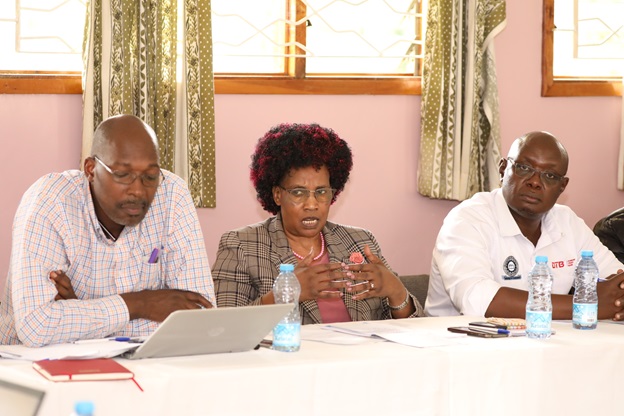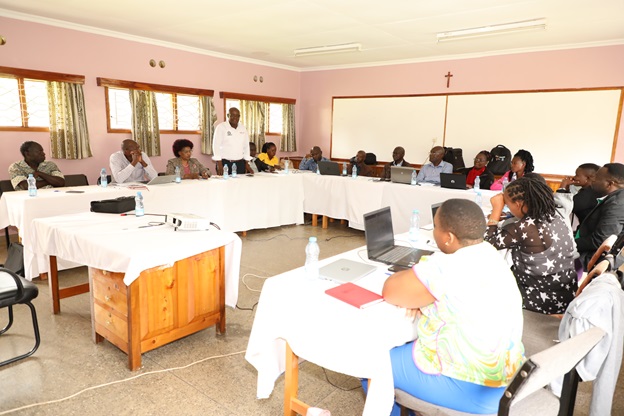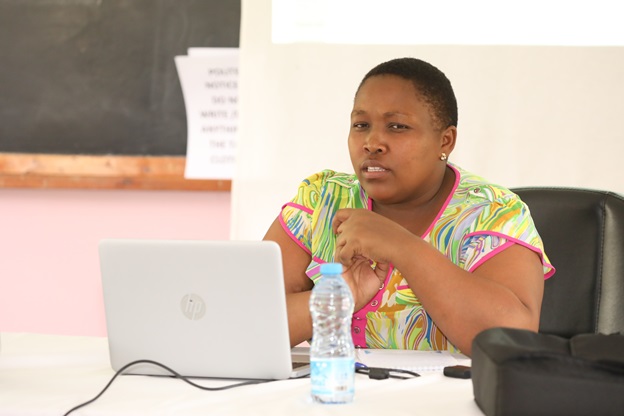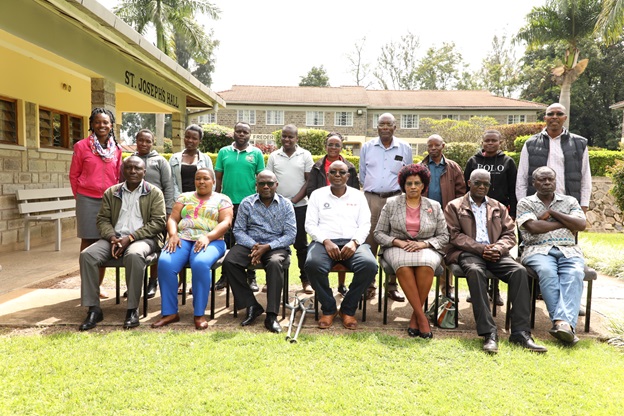The participants of the stakeholder meeting at Bishop Nicholas Stam.
Researchers from Masinde Muliro University of Science and Technology in collaboration with the stakeholders from the Department of Water, Environment, Natural Resources and Climate Change (Kakamega County) have called for people-centered action in addressing the impacts of Climate Change on Human Security. This was revealed during a stakeholder meeting held on 7 July 2023 at Bishop Nicholas Stam. The research is aimed at providing solutions to mitigate the impacts of climate change on human security in the Lake Victoria Basin.
The findings revealed that climate change is connected to various human insecurities that are putting pressure on fragile food ecosystems thus worsening food insecurity in Africa. The researchers advised that a people-centered action approach allows for more targeted and community-driven solutions that address immediate vulnerabilities while also building resilience and protecting livelihoods in the long term. The scholars comprised of Prof. Edward Neyole (Principal Investigator), Prof. Frank Matanga, Prof. Josephine Ngaira, Dr. Ferdinand Nabiswa, Dr. Saidi Fwamba, and Dr. Edward Mugalavai.
This project seeks to address the impacts of climate change on the county ecosystem, economic sectors, and human security which will bring about the drivers behind climate change, such as greenhouse gas emissions, deforestation, urbanization, and population growth while adapting to the effects of climate change.

From left; Prof. Edward Neyole (Principal Investigator), Prof. Josephine Ngaira and the Director, Privately Sponsored Student Programs, Prof. Benedict Alala during the meeting.
The Director, Privately Sponsored Student Programs, Prof. Benedict Alala noted that many scholars have documented the security implications of climate change however lack of consensus still exists among experts and policy makers on how climate change and human security are related. He advised further research and joint efforts are thus necessary to address this global threat. Prof. Alala was representing the Deputy Vice Chancellor, (Planning, Research, and Innovation) Prof. Charles Mutai.
Speaking on behalf of the Chief Officer in charge of Environment, Natural Resources, and Climate change Mr. Justin Mutobera, the Director for Natural Resources Mr. Anthony Munanga thanked the MMUST fraternity for embracing the program noting that the research output will not only come up with the effects but also come up with long term solutions that will enable residents adapt to the changes of climate both socially and economically.

The Director, Privately Sponsored Student Programs, Prof. Benedict Alala addressing the participants.
Similarly, the Chief officer for Risk Management and Service Delivery, Dr. Phitalis Masakhwe noted that the research outcome will provide interventions and policies that will address climate change. This will create innovative ideas and initiatives to combat climate change regionally.
According to the County Director of Disaster Management Ms. Abigael Chepkorir’s presentation on ‘Making Cities Resilient 2030’, this is a unique cross-stakeholder initiative for improving local resilience through advocacy, sharing knowledge, and experiences. It is aimed at ensuring cities become inclusive, safe, resilient, and sustainable by 2030.

The County Director of Disaster Management Ms. Abigael Chepkorir making her presentation.
The MCR2030 approach is anchored on a three-stage ‘resilience roadmap’ that guides cities on how to improve resilience over time. Its major goal is to move cities to the end of Stage C, where they have mainstreamed resilience, and focus on monitoring and evaluation, to ensure they maintain the level of resilience achieved.
Ms. Chepkorir called upon the researchers to partner with them in implementing the Stage B of MCR20230, which requires improving risk analysis, and diagnostics skills for proper planning, strategies, policies, and responses. “Let us join hands in making Kakamega an urban disaster-resilient city,” she urged.
Stakeholder engagement is touted as a critical ingredient in building climate action momentum. There is a need to amplify youth voices and engage young people in an open and transparent dialogue as we gear up to raise ambition and accelerate action to address the climate crisis.
By Linet Owuor
Photos by Shiundu Masafu





